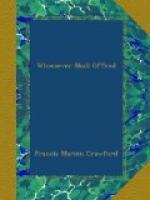“Professor Kalmon is here,” said the Signora’s voice out of the gloom. “I have asked him to stay till to-morrow.”
The Professor rose up in the shadow and came forward, just as a servant brought a lamp. He was celebrated as a traveller, and occupied the chair of comparative physiology in the University of Milan. He belonged to the modern type of scientific man, which has replaced the one of fifty years ago, who lived in a dressing-gown and slippers, smoked a long pipe, and was always losing his belongings through absence of mind. The modern professor is very like other human beings in dress and appearance, and has even been known to pride himself on the fit of his coat, just like the common people.
There were mutual greetings, for the Professor knew all the party, and everybody liked him. He was a big man, with a well-kept brown beard, a very clear complexion, and bright brown eyes that looked as if they would never need spectacles.
“And where have you been since we last saw you?” asked Corbario.
“Are your pockets full of snakes this time?” asked Aurora.
The Professor looked at her and smiled, realising that she was no longer the child she had been when he had seen her last, and that she was very good to look at. His brown eyes beamed upon her benevolently.
“Ah, my dear young lady, I see it is all over,” he said. “You will never pull my beard again and turn my pockets inside out for specimens when I come back from my walks on the beach.”
“Do you think I am afraid of you or your specimens?” laughed Aurora.
“I have got a terrible thing in my waistcoat pocket,” the Professor answered. “Something you might very well be afraid of.”
“What is it? It must be very small to be in your waistcoat pocket.”
“It is a new form of death.”
He beamed on everybody with increasing benevolence; but somehow nobody smiled, and the Signora Corbario shivered and drew her light cloak more closely round her, as the first gust of the night breeze came up from the rustling reeds that grew in the pool below.
“It is time to get ready for supper,” said Folco. “I hope you are not hungry, Kalmon, for you will not get anything very elaborate to eat!”
“Bread and cheese will do, my dear fellow.”
When Italians go to the country they take nothing of the city with them. They like the contrast to be complete; they love the total absence of restraint; they think it delightful to dine in their shooting-coats and to eat coarse fare. If they had to dress for dinner it would not be the country at all, nor if dinner had to begin with soup and end with sweets just as it does in town. They eat extraordinary messes that would make a Frenchman turn pale and a German look grave. They make portentous pasties, rich with everything under the sun; they eat fat boiled beef, and raw fennel, and green almonds, and vast quantities of cream cheese, and they drink sour wine like water; and it all agrees with them perfectly, so that they come back to the city refreshed and rested after a gastronomic treatment which would bring any other European to death’s door.




